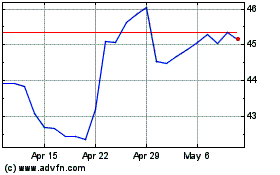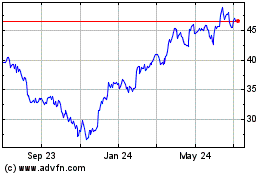By William Boston
BERLIN -- After fixing a French car manufacturer long derided by
the industry as an eternal also-ran, Carlos Tavares is turning his
attention to the business General Motors Corp could never fix.
Mr. Tavares, who on Wednesday unveiled another quarter of solid
growth at PSA Group, maker of Peugeot and Citroen cars, is turning
up the pressure on Opel, the loss-making German brand he acquired
from GM this summer.
Over the past three years, the 59-year-old native of Portugal
has taken PSA from near death to Europe's most profitable maker of
large volume cars. The acquisition in August of GM's European
businesses Opel and Vauxhall hoisted the French car maker into the
number two spot in Europe by sales behind Volkswagen AG.
Mr. Tavares hasn't wasted time in moving to improve returns.
In response to sluggish sales of some Opel and Vauxhall models,
Peugeot said it would cut nearly a quarter of the 1,800 employees
at Vauxhall's Ellesmere Port plant in the U.K.
Peugeot said it would be in "a better position to consider
future investments" in the Vauxhall business once the terms of any
post-Brexit trade deal between the U.K, and the European Union
become clear.
Mr. Tavares has also been pressing the German management at Opel
to accelerate efforts to return to profit as Europe's booming car
market is beginning to plateau.
Since the acquisition closed in August, Peugeot and Opel
managers have hammered away at a restructuring plan that German
labor leaders warn could put thousands of Opel engineers out of a
job.
Peugeot's path to profitability was painful.
After Mr. Tavares took control in 2013, the company was bailed
out by the French state and Chinese auto group Dongfeng Motor
Group, now its two biggest shareholders. Peugeot, running big
losses amid mounting labor costs and falling sales, slashed jobs
and production to cut costs, skidding past a looming
bankruptcy.
But the efforts paid off. On Wednesday, Peugeot reported a 31%
rise in third-quarter revenue to EUR15 billion ($17.64 billion),
driven by strong growth in all regions except China and healthy
demand for its new Peugeot 3008 and 5008 sport-utility vehicles.
The revenue includes two months of business from the Opel Vauxhall
division. Without Opel Vauxhall, Peugeot sales rose 7% to EUR12.2
billion in the quarter.
Peugeot didn't report third-quarter profit. On a call with
analysts, Jean-Baptiste de Chatillon, the company's finance chief,
said losses at Opel Vauxhall would weigh on Peugeot's earnings in
the second half of the year, saying: "The recovery plan will kick
off beginning in 2018."
Peugeot's share price dipped 0.6% on the news to EUR20.27. The
company's share price has nearly quadrupled since Mr. Tavares was
appointed chief executive in November 2013.
With Peugeot's core business profitable again, Mr. Tavares
embarked on an expansion strategy earlier this year, acquiring GM's
German Opel unit and its British Vauxhall subsidiary for EUR2.2
billion.
After years of losses at Opel, GM Chief Executive Mary Barra
pulled the plug on the German business after running it for more
than 80 years. On Tuesday, GM said it took a $2.3 billion charge
related to the sale of Opel Vauxhall.
Opel's German managers have traditionally blamed GM for the
company's history of losses and the brand's failure to keep up with
its more illustrious European peers -- an argument Mr. Tavares has
dismissed as a convenient but disingenuous excuse.
"Opel's results are mainly the consequence of Opel's decisions,"
he told German daily newspaper Die Welt last week. He has
previously said that Opel's production costs were 50% higher than
those at Peugeot's French plants.
Peugeot sells 35 new cars per employee, compared to 30.4 for an
Opel or Vauxhall employee, according to a recent study by Ferdinand
Dudenhöffer, head of the Center for Automotive Research at
Duisburg-Essen University. He said that Opel would need nearly
5,000 fewer employees if its factories were as productive as
Peugeot's French plants.
Once they looked under the hood at Opel, Peugeot officials were
also surprised to discover that the German car maker was on a
trajectory to miss the European Union's 2020 greenhouse-gas
emissions targets, which could result in significant fines.
"We are working very hard on the team to change that," said Mr.
Chatillon, Peugeot's finance chief. "We have to meet the
targets."
Mr. Tavares wants Peugeot and Opel to share technology and
development to eliminate duplication, particularly in high-cost
areas such as engine design and production. As a first project, the
next generation of Opel's popular Corsa compact will use Peugeot
technology.
Opel uses nearly three times as many individual model platforms
as Peugeot, requiring a larger number and variety of components
from engines and transmissions to steering wheels and brakes.
Taking a page from Volkswagen's playbook -- which shares
technology development across its eight car brands to avoid
duplication -- Mr. Tavares plans to create technology centers that
share development between Peugeot, Citroen, Opel and Vauxhall.
However, while efficient, the changes could affect thousands of
jobs at Opel.
--Max Bernhard contributed to this article.
Write to William Boston at william.boston@wsj.com
(END) Dow Jones Newswires
October 25, 2017 05:52 ET (09:52 GMT)
Copyright (c) 2017 Dow Jones & Company, Inc.
General Motors (NYSE:GM)
Historical Stock Chart
From Mar 2024 to Apr 2024

General Motors (NYSE:GM)
Historical Stock Chart
From Apr 2023 to Apr 2024
